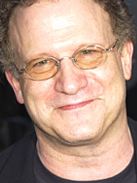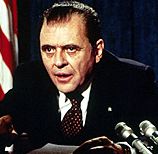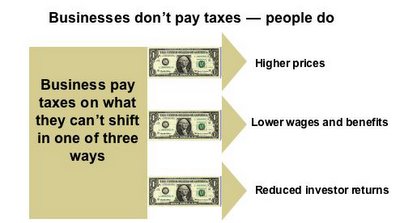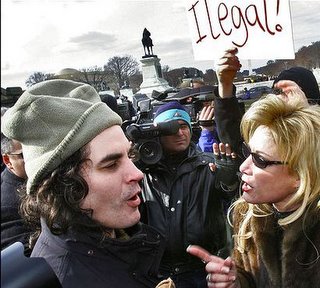Monday, February 27, 2006
Fun With Science
I mocked up a still, wrote something about prohibition, and finished it off with a barrel of booze represented by a baby food jar full of Schlitz. (For you young folks, that's an old brand of beer. My research had not taken me quite so far as to learn that beer was the product of fermentation, not distillation.) Now that I think about it, mine was actually more of a social science fair project.
So what should we call the science fair for the home schooled sponsored by the Twin Cities Creation Science Association? The TCCSA proclaims: "Unlike Many Secular Educators We Teach The Scientific Method!"
P.Z. Myers of Pharyngula visited this year's fair and provides a great report. For example, are a few suggested research topics:
12. Trilobites prove Noah's flood because they are curled up or not?
58. Why did God create the moon to control the tides?
72. What is God made of?
92. Why do some animals lay eggs and others bare [sic] babies alive? Why did God do it this way?
97. Why did God make birds to fly?
05.What are aliens and are there really any in our world? see Lamentations 5:2, Eph 2:12, Heb 11:34.
(via after school snack)
Saturday, February 25, 2006
Why Dubai Ports Deal Should Be Reviewed
The problem with dealing with other nations' leaders is precisely this: We are picking one form of sleaze over the other. We're not happy with someone the country elected. Imagine what the entrenched royal families are like...
Friday, February 24, 2006
Before the Golden Mosque

Oh, I know this will sound to Ann Coulter that I want to restore Saddam Hussein to power, but Ann doesn't read ATGD.
After generations of U.S. foreign policy that played Pick Your Despot, some bright boys decided we could just remove one we didn't like and Give Iraqis Freedom. Now the Sunnis and Shiites are showing us that our Red State/Blue State politics is just pattycake. And exporting democracy to a tribal society that measures grievances in centuries is not a task, it turns out, for a C student who got his first real job just over a decade ago.
Instead of leaving Saddam to murder Kurds and Shiites, we eliminated the middle man. With an assist from al-Qaeda and rigid sectarianism, there's now equal-opportunity madness. Saddam was a bad critter, but al-Qaeda set up shop in Afghanistan, not Iraq, and all the mosques were still standing.
Trying to fix something you've wrecked is an admirable trait, but this calls for the mother of all insurance adjusters to tell us whether this one is totaled.
What's happening in Iraq today is profoundly sad, and it didn't start with the Golden Mosque.
Oh, Now I Get It!
Jane at Firedoglake cites digby noting Sen. John Warner's comment that the Dubai ports deal is about preserving the Fifth Fleet's access to Dubai's deep water port. And she adds this quote from Richard Clarke's Against All Enemies:
The Defense Department agreed to our request to station an additional aircraft carrier battle group in the waters off Iran temporarily, as a deterrent signal to Tehran. The Navy was growing increasingly concerned with anti-ship missiles that Iran was placing on islands in the Persian Gulf and on its coastline, particularly at the narrow point in the Gulf leading to the Indian Ocean, the Straits of Hormuz. In early May [1996], DOD announced that Iran had acquired long-range missiles from North Korea and was engaged in a program to protect its missiles in hardened bunkers.
The Navy relied on two ports in the Persian Gulf. Only one, in the United Arab Emirates, could handle an aircraft carrier. That port, near Dubai, saw more U.S. Navy ships anchored and more U.S. sailors ashore than any harbor outside the United States during the 1990s.
Thursday, February 23, 2006
A Short Hop from Subways to Propaganda
I got waylaid by these quotes from Propaganda by Edward Bernays, the guy whose real last name seems to be "the father of American public relations."
The conscious and intelligent manipulation of the organized habits and opinions of the masses is an important element in democratic society. Those who manipulate this unseen mechanism of society constitute an invisible government which is the true ruling power of our country.
...
It was, of course, the astounding success of propaganda during the war that opened the eyes of the intelligent few in all departments of life to the possibilities of regimenting the public mind. The American government and numerous patriotic agencies developed a technique which, to most persons accustomed to bidding for public acceptance, was new. They not only appealed to the individual by means of every approach—visual, graphic, and auditory—to support the national endeavor, but they also secured the cooperation of the key men in every group—persons whose mere word carried authority to hundreds or thousands or hundreds of thousand of followers. They thus automatically gained the support of fraternal, religious, commercial, patriotic, social and local groups whose members took their opinions from the accustomed leaders and spokesmen, or from the periodical publications which they were accustomed to read and believe.
At the same time, the manipulators of patriotic opinion made use of the mental clichés and the emotional habits of the public to produce mass reactions against the alleged atrocities, the terror, and the tyranny of the enemy. It was only natural, after the war ended, that intelligent persons should ask themselves whether it was possible to apply a similar technique to the problems of peace… The important thing is that it is universal and continuous; and in its sum total it is regimenting the public mind every bit as much as any army regiments the bodies of its soldiers.
— Via American Idealism.
Bernays had a gift for cooking up extravagant public relations campaigns and one of his most famous ones was when he was hired by the American Tobacco Company. The head of the company, George Washington Hill, want to make Lucky Strikes the most smoked cigarette in America by opening up a whole new market of prospective smokers — women. At the time, people thought women who smoked were of low character and those in the better classes who did smoke, did so in secret.
The first part of the campaign was to launch the slogan “Reach for a Lucky Instead of a Sweet.” Arthur Murray, the famous dancing school founder was then engaged to claim that his dance instructors smoked to keep their slim figures instead of overeating the food and punch offered at public gatherings.
This propaganda pitch was quickly followed by finding a doctor to endorse the idea that smoking after a meal had several health benefits including being able “to disinfect the mouth and sooth the nerves.” Hotels were then urged to add cigarettes to their dessert menus! Menus prepared by House and Garden were circulated that recommended smoking instead of eating dessert as part of a healthful diet.
No venue was missed by Bernays. Homemakers were told to be sure to stock up on cigarettes as they were now household kitchen staples like salt, sugar and the like.
And now it's past even my bedtime.
Wednesday, February 22, 2006
Searching for Cheney in the Muslim World
But then I was reading some foreign press stories on a new site called Watching America, and came across an item from Israel excoriating Cheney. Most of it was a predictable and brief rehash, but a couple lines struck me:
No one is expecting inspiration from a Persian punk at the gate of Tehran, but many people on the planet, hundreds of millions, still expect some moral direction from those sitting on high in Washington.
...
Even the head of Israel's Shin Bet was secretly recorded as saying that "as Israelis, we actually long for Saddam Hussein."
 Nothing we haven't seen before — a so-called tough guy grimace that might just as well be from passing angina or permanent stroke damage. But suddenly, I thought: Albert Brooks.
Nothing we haven't seen before — a so-called tough guy grimace that might just as well be from passing angina or permanent stroke damage. But suddenly, I thought: Albert Brooks.  Brooks has to play Cheney in the movie. Oliver Stone will write and direct, of course, but we can't let him cast Anthony Hopkins. Sure, he'd be scary in that scene where he's hunting for John Kerry in the cornfield.
Brooks has to play Cheney in the movie. Oliver Stone will write and direct, of course, but we can't let him cast Anthony Hopkins. Sure, he'd be scary in that scene where he's hunting for John Kerry in the cornfield.  But Albert Brooks will bring a lovable haplessness to the role.
But Albert Brooks will bring a lovable haplessness to the role.Fred Gwynne would make a perfect Kerry, and since Gwynne is dead, he'd lend about the right amount of pathos and animation. But it's probably too much to ask, even of special effects.

Where was I? Oh yeah. Watching America pulls together views of the U.S. from other nations' media. The usual, mainstream suspects like The Times, Der Spiegel and Le Monde, but it also translates stories from sources like El Tiempo (Venezuela), Alwatan (Kuwait), Pak Tribune (Pakistan), Guangzhou Daily (China) and Al Riyadh (Saudi Arabia). As if we don't feel badly enough already.

Oil is Thicker Than Water
One is Treasury Secretary John Snow, whose agency heads the federal panel that signed off on the $6.8 billion sale of an English company to government-owned Dubai Ports World - giving it control of Manhattan's cruise ship terminal and Newark's container port.
Snow was chairman of the CSX rail firm that sold its own international port operations to DP World for $1.15 billion in 2004, the year after Snow left for President Bush's cabinet.
The other connection is David Sanborn, who runs DP World's European and Latin American operations and was tapped by Bush last month to head the U.S. Maritime Administration.
— White House Has Ties to Dubai Firm
By Michael McAuliff
The New York Daily News (via)
Should a foreign-owned company be managing U.S. ports? Sorry, but the ports and shipping business is already dominated by foreign companies. And as long as we keep buying cheap foreign products, China and Middle Eastern countries are going to be buying in to other businesses here.
Don't like the Arab-government affiliation? How about going with another big player, AP Moller-Maersk, a Danish company, to show that we Americans won't cave in to censorship. That'll show them Arabs.
I'm not going to engage in paranoid speculation about Bush family connections to Middle East Oil, the Carlyle Group, etc. Others will be running than stuff down, and there's plenty enough to worry about right in front of our noses.
The management team that gave us the social security privatization plan (John Snow was the guy selling that one, too), the Medicare drug benefit plan, the Iraq rebuilding contracting scandals and the bungled Katrina response wants us to trust them that they've done their due diligence on the ports deal? And a President who's simply ignored the intent of legislation he didn't like will now exercise his first veto on any attempt by Congress to modify his decision?
The biggest worry for me here is that the Administration's hubris, secrecy and power mania have gotten so far out of control that it isn't even bothering to spin any more. And the Republicans are finally starting to notice. In a year, Bush & Co. may be looking back with nostalgia on the good old quail hunt flap.
Monday, February 20, 2006
I Know an Old Lady Who Swallowed a Fly
When we deny each other’s reality, we may begin to deny each other’s humanity.
When we deny each other’s humanity, we find it easier to kill each other.
When we kill each other, we make more enemies.
When we make more enemies, we feel less free.
When we feel less free, we keep more secrets.
When we keep more secrets, we stop telling the truth others.
When we stop telling the truth to others, we stop telling the truth to ourselves.
When we stop telling the truth to ourselves, we deny reality.
It Can't Happen Here?
"Parliamentary democracy is by definition rotten, because it does not represent the voice of the people, which is that of the sublime leader. Doctrine outstrips reason, and science is always suspect. The national identity is provided by the nation's enemies. Argument is tantamount to treason. Perpetually at war, the state must govern with the instruments of fear. Citizens do not act; they play the supporting role of 'the people' in the grand opera that is the state."
The Tax Man's Burden
Whether it's gambling, smokes or booze, Minnesotans have a lighter "sin tax" burden than the national average, according to data just released by the U.S. Census Bureau.
The 2004 data, the most recent available, show that Minnesotans pay more in state taxes per capita than residents of most other states — we rank fourth. That's mostly because Minnesotans have higher incomes than residents of many states and because Minnesota relies more heavily on a state progressive income tax than on local taxes.
— "Minnesota's tax burden is ranked 4th in U.S.," StarTribune
Note: I started this post 10 days ago, but was getting too wonkish. This a summary of a too-dense draft.
The article gives a reasonably balanced view of what a state "tax burden" ranking means, but with the focus on sin taxes and the state ranking, most readers are likely to remember just the headline and conclude: Our taxes are too high.
Whether you live in Minnesota or another state, here are some things to keep in mind when you hear candidate rhetoric about high taxation levels.
State taxes are only part of the tax picture. States typically rely on a mix of taxes on personal income, corporate income, property, and sales, along with special taxes on consumption of items like gas, liquor, cigarettes, and gambling. County, municipality, school district and other special district assessments that fund public services may not be included in "state tax" comparisons. Neither are fees and other charges for services.
The Tax Foundation says, "some states accomplish at the local level what other states accomplish at the state level, so a degree of comparability is lost as a result. For example, New York's state sales tax rate is 4 percent, and its counties have local sales tax rates that range from 3 percent to 5.75 percent. Connecticut, on the other had, has a 6 percent state-level sales tax with no local add-ons. In a ranking that includes only state-level taxes, New York appears less taxed than it actually is, and Connecticut appears more taxed."
Tax dollars per capita is a poor basis for comparison. For example, a state with a $20k average income and 12% tax rate would collect $2,400 per capita; a state with a $17k income and 14% tax rate would collect $2,380 per capita. Yet the state taking a higher percentage of income would still earn a better ranking. Minnesota's number four per capita ranking seems reasonable, given our number five ranking for median average income.
What are taxpayers getting for their investment? Comparing tax levels is also meaningless without comparing the level and quality of government services. The kind of life we want should be part of the discussion about what's a fair price for government services.
Politicians will pick numbers that support their ideology. Tax foes will use the Census Bureau because of Minnesota's misleading high ranking. Business advocates will cite Minnesota's top five ranking for its corporate income tax rate, even though few businesses in the state pay the corporate tax (accounting for $700 million of $28.8 billion in state revenues). Progressives may push for taxes on business, overlooking that these taxes are typically passed through to consumers.

When candidates start talking about "tax burden," press them to talk instead about the total funding picture. The “Price of Government” index is a better measure of the cost of all general government services statewide. It includes nearly all revenues generated by state and local units of government through state taxes, property taxes, special assessments, fees and charges for services such as licenses, bus fare or tuition.
Friday, February 17, 2006
Hypocrisy-Affiliated
Considering 28 of the 31 Democrats have received Abramoff-affiliated funds themselves, it appears their hypocrisy has exceeded even their partisanship.
— Tracey Schmitt, Republican National Committee
• Money which did not come directly from confessed corrupt lobbyist Jack Abramoff. It came from some of his clients. Actual Abramoff funds were reserved for Republicans.
• Money from Indian tribes that were Abramoff clients. These tribes had contributed to Democrats before Abramoff got his hooks into them. After they became his clients, they did not increase these contributions, but did substantially increase contributions to Republicans.
Hearing these folks complain about hypocrisy is like listening to Sadaam Hussein complain about not getting a fair trial.
Thursday, February 16, 2006
The Longest Two Seconds
Bodies do not rise and fall in slow motion, so the real time must have gone like this... He launches when his Norton motorcycle meets my front wheel. One Mississippi. Two Mississippi. Impact head-first, a helmet-tipped missile striking the pavement.
The longest two seconds of my life.
We men carry around images of ourselves — fast ball hitter, great lover, excellent driver — so easily borne past their expiration date because they are so rarely tested. Then someone goes flying through the air because we sent him, and we find out who we really are.
To admirers and detractors alike, Dick Cheney was a man in control. A man handy with a gun, even if his bird hunting more closely resembled skeet shooting. And then Harry Whittington dropped bloodied in a south Texas field.
Now Dick Cheney says, "The image of him falling is something I'll never be able to get out of my mind. It was, I'd have to say, one of the worst days of my life."
Though I sometimes find the vice president's words suspect, I believe him on this point. The fact Whittington survived will not erase the memory of those first horrible seconds.
Miraculously, the flying motorcyclist walked away intact. He accepted my apology with grace, and I promised to dig into my meager bank account to fix his bike. It took months before I got behind the wheel again, and more than 30 years later, I still look for the next stranger riding in my blind spot.
Dick Cheney the tough guy may never again take a gun in his hands without thinking of that man on the ground. But on one of the worst days of his life, Dick Cheney went to dinner instead of the hospital.
Tuesday, February 14, 2006
I've Got Nothing Against Gays, But...
To treat same-sex relationships in every respect as if they were marriages will open a Pandora's Box of mischievous consequences. For example, in jurisdictions where same-sex unions are treated as marriages, aggressive efforts have begun to repeal laws against polygamous or polyamorous marriages.
— Robert G. Kennedy, Star Tribune
In the quote above, Mr. Kennedy is deliberately indistinct on the actual whereabouts of these plural jurisdictions where "aggressive efforts" are under way. It's true Canada recently approved same-sex unions, and then Prime Minister Paul Martin commissioned a study to show the polygamy argument was nonsense. Instead, the panel recommended that Canada repeal its anti-polygamy law since the country wasn't enforcing it. And then the Conservatives spanked the Liberals in the election.
As for other aggressive efforts in the Canadian jurisdiction, there's a small enclave of radical polygamists already established well before same-sex marriage was approved — fundamentalists up in Bountiful, British Columbia, who left their forebears in the Mormon badlands along the Utah/Arizona border.
According to Minnesota State Senator Michelle Bachmann, "group marriage is now legal" in the Netherlands. In actuality, the country legalized same-sex marriage in 2001 after approving civil unions in 1998, but marriages involving more than two people are still illegal. Last September, a man and two women signed a cohabitation contract, a civil union registered before a notary. Friends of traditional marriage are flipping, of course, but this is apparently the first such test of Dutch registered partnerships in the seven-plus years since they were permitted.
That's it. That's the extent of the big polygamy campaign.
Law Professor Marci Hamilton took a look at some prosecutions of polygamists in Utah, and concluded that constitutional appeals weren't likely to prevail. The state does have a legitimate interest in banning polygamy, she writes:
History shows that polygamous marriage — at least as it has been practiced in the United States by multiple religious sects —raises a significant danger that underage girls will be married to much older men. In other words, it has fostered and condoned statutory rape. There is also disturbing evidence that underage girls are being trafficked across state and international lines for purposes of polygamy, a practice that violates the federal Mann Act. ...
History shows that polygamy raises a danger of incest as well. Polygamous husbands have married their own daughters or nieces.
This doesn't convince traditional marriage advocates like Bachmann, who argues: If the law defines marriage or its legal equivalent as something other than man-woman, then the basis for marriage becomes adult consent, which means marriage means anything — which means marriage means "essentially nothing."
This is "Christmas just isn't Christmas if the Target clerk tells me Happy Holidays" all over again. I understand Bachmann's feelings. It's just not a legal argument.
Then there's the complementary biology rationale, which goes like this. Marriage recognizes the unique relationship between male and female, yin/yang, the old in and out. It's not about romantic love; it's about science. As uniter-not-a-divider Bachmann says, "Biology teaches us that marriage is between a man and a woman because of the way our bodies are designed, the way a man and a woman complement each other."
Read Jon Krakauer's Under the Banner of Heaven, and it's not hard to conclude the trip from dominant male/submissive female to polygamy is a lot shorter and straighter than from two men or two women. The rich, powerful and/or crazy men rule the roost. Same-sex unions confound that order every which way. Who gets to be the man in the relationship when there are two men — or none? And if the man isn't the one on top, then... chaos!
When they aren't appealing to biology or slippery slope toward the Rubicon legal arguments, supporters of a constitutional amendment to ban same-sex unions couch their opposition in love, god and family. They profess to have nothing against gays, might even let them live next door.
So let's call them on it. Let's stand side-by-side with them to oppose polygamy, bigamy, sex slavery, pedophilia, and unholy group matrimony involving any possible combinations of men, women, children, dogs, horses, rabbits and vibrators. We'll support appointment of anti-polygamy judges. But somehow, I think they're still going to want their marriage amendment.
Quail Hunting in America
The anticipation builds as you ease up behind the dogs, rock solid on point in front of you. Muscles tighten, the gun quivers, and you ask yourself, "Is this going to be a bobwhite quail, or chukar partridge, or maybe the big cock pheasant you've been looking for all morning?" Now you're even with the dog and still no birds have broke. About that time you start to think that maybe the bird has moved on. You relax just a little, and turn your head to the guide for instructions. That's when they catch you off guard, as the air around you explodes with the whirring of wings and clucking of a half dozen escaping Chukar. The guide yells out, "Bird up!", and you try to regain your composure enough to snap off a couple of shots before they get completely out of range. Maybe this time you connect, maybe you don't, but it really doesn't matter, when you're hunting in Texas with us. There's plenty more birds!
— Texas quail hunting with the Hunting in Texas guide service
At last, "Cheney" dislodges "Mohammed Cartoon" from its run as the top search on Technorati. It's hard to make light of the Vice President's hunting mishap after watching Vice Presidential Firearms Mishap Analyst Rob Corddry break it down on The Daily Show, so I'll leave it to the experts. Crooks and Liars has the video.
Defenders of the Vice President say Whittington should have announced himself if he didn't want to get shot, sort of like Cool Hand Luke getting permission from the boss to come up out of the ditch after taking a leak. No one has yet raised the difficulty of identifying a quail with muscles tightening, gun quivering and diseased heart palpitating. It's not as easy as you think.






Sunday, February 12, 2006
Lies Like Truth
Guess which I read first?
Reading these books so soon after James Frey's A Million Little Pieces illuminated what disbeliefs we willingly suspend when reading fiction created from life experience. In both Old School and Devil, the narrators are aspiring writers who encounter celebrities and dishonestly attempt to use this connection to advance themselves. Wolff writes about the overheated world of an all-boys prep school, where students compete for the honor of a private audience with a visiting luminary, who selects the winning story. Lauren Weisberger's novel is about high fashion as seen by a young woman who dreams of writing for The New Yorker and hopes that serving as personal assistant of an extremely influential and abusive magazine editor — not actually writing anything — will somehow give her the inside track.
Right out of college, Weisberger spent a year as a personal assistant to Anna Wintour, editor in chief at Vogue, and turned the experience into a first novel. It gained readers — and a movie deal — entirely on the basis of the unrelenting portrait of the character widely presumed to be based closely on Wintour.
Wolff himself gained entry to an eastern prep school through deceptive means. He presents Robert Frost, Ayn Rand and Ernest Hemingway as characters. He uses personal experience, elements from real people and actual events, readings remembered and forgotten, and throws them all in a tumbler of imagination. Because he is an artist, he creates a deep and layered story that we know is fiction, but we accept as showing us a kind of truth — about deception, including self-deception. Ultimately, it matters not whether Rand made such an appearance at a school or whether Wolff did either.
For all I know, Weisberger approached her first novel the same way — but we don't read it the same way. We read in hopes of discovering the reality behind the powerful Wintour's carefully crafted persona. Is she really such a bitch goddess on wheels? What indignity will she demand next? Is the villainess a comic invention or does she closely follow the real life editor? Doesn't matter. Neither the book, nor the movie starring Meryl Streep, would have gotten made without Weisberger's association with Wintour — and without our complicity in believing we're reading a true story masked as a novel. The other characters hold no interest at all.
Ironically, that's why Frey's book had no luck when it made the rounds as a novel. If you are going to make up a story, predictable plotting, cheesy melodrama and hollow characters won't cut it. Unless you know somebody. But the ex-frat boy didn't have even the semi-celebrity of a Lewis Libby or a Lynne Cheney, or the inside track of, say, Robert Downey, Junior's dealer. Even Jose Canseco's ex can land a book deal if it purports to give us the real dirt on the rich and famous.
Frey's life story, which had no market as non-fiction, got amped up into fiction and still couldn't sell — until he re-appropriated it as his own true story. Weisberger took a juicy story that was possibly true, but couldn't sell as non-fiction, because she had no standing as an author — and Wintour would've rained lawyers and intimidation all over her butt. But as a fiction writer, she could deny what she wrote was based on Wintour and wink all the way to Hollywood.
Long ago, I wrote a story about trying to make sense of an old photograph of a girl and her father, found in a house just before it's demolished to make way for a freeway exit. The photograph was real. The house was really taken. The man in the photo did die as I said. It was true and not true and true.
It said, in a search for hidden meaning, hidden meaning will be found.
Saturday, February 11, 2006
Found Art

I was staring at a photo of a Chinese lead plant that I wrote about back in November, thinking about walls I'll soon be painting. Aging Chinese walls often looked like abstract paintings, and the wall around the plant certainly had acquired an interesting patina composed of crumbling plaster, smoke and fading slogans.
Suddenly, there in a section of the wall, I saw a clown-like Mao bowing his head, too late for the poisoned children.
Thursday, February 09, 2006
Bingo Tom
Will: Who is Robert Russell?
Josh: He's the Congressman from Western Colorado, and I don't mean the state, I mean the mining company.
Toby: Bob Russell is not presidential.
C.J.:...Is he Bingo Bob?

A pair of swastika-wearing brown shirts showed up, asking the rally-goers to leave the Republicans and join the Nazi party. I thought they might be clever counter-demonstrators, but it turns out they may have been legit. No confirmation whether counterfeit demonstrators or "iliterate" supporters carried the "ilegal" placards (Photo Credit: By Bill O'leary -- The Washington Post). That's the trouble with trying to follow Tancredo. Stuff that looks like parody turns out to be real.
He sounds quite rabid in the NPR report from the scene, crying: "We have a war! We are facing a military on the other side of the border — an armed military — who periodically come into the United States of America... armed, threatening our people, threatening the border patrol."
He's referring apparently to a border incident in which a county sheriff chasing drug dealers watched an olive colored Humvee come from the Mexican side bearing men wearing military-style uniforms who evacuated one of drug runners' SUVs when it got stuck in the river. (One more strike against SUVs!) The U.S. State Dept. says these were not members of the military, but known members of a narco-trafficking ring that employs military-style uniforms, equipment and tactics.
This would not be the first time the State Department and Republican officials disagreed on a pretext for war.

No, not that Team America!
Wednesday, February 08, 2006
The Only Thing They Understand
This song I knocked out in one sitting based on a simple tenor guitar groove. It was written after the Koran-in-the-toilet accusations and before the Mohammed cartoon protests. Like the song "Local Boys," it adopts an extreme point of view in order to criticize extremism of all kinds. Of course, the danger of that approach is both the lefties and the rightines will think that's the writer's point of view — a song that Toby Keith would do with a straight face.
Thanks to Al VanArdsal for the arrangement that makes it sound more like a serious song. It could use a bridge and more dynamics in the recording; the performance needs more Steve Earle and less Mark Knopfler later in the vocal, but hell, it was one take.
Seem like someone should do somethin'
Don't we gotta take a stand
Can't go running out the back door
That's no way to be a man
That's no way to be a winner
Gotta show we're in command
Gotta grind 'em down to nothin'
The only thing they understand
They want a fight, they're gonna get one
They want a war, they'll get a war
We'll eye for eye and tooth for tooth 'em
Til they can't take it anymore
They can see there's no tomorrow
And there's no hope throughout the land
Except to die and get it over
The only thing they understand
I don't know why they hate our freedom
But it doesn't matter now
Cause we're rollin on our mission
To knock their cities to the ground
Knock some sense into their people
Pour their blood upon the sand
Til their women beg for mercy
The only thing they understand
In the name of all that's holy
We are marching off to war
They will hear our rolling thunder
Fear our terrible swift sword
Feel the vengeance of the righteous
Wipe our ass with their Koran
And defile their holiest places
The only thing they understand
MP3 File
Get Minvolved
Because of its Minnesota base, Powerline falls under the withering gaze of Minvolved, which focuses on Minnesota politics from a progressive point of view. If your interest is getting more involved in state and local matters, it's worth a look.
Tuesday, February 07, 2006
Damn, I'm Rich!
Keep in mind that, above a certain level of subsistence, much of your welfare springs from your inner stories and narratives, not from concrete goods and services. Your real advantage in life, if you are born sufficiently wealthy, is your ability to tell yourself beneficial stories.
— Tyler Cowen
What Kind of Contract Did She Sign?
I'm not surprised that parents in the town of 2000 would demand the teacher be fired for showing their kids a "satanic video." What I find shocking is there are still public elementary schools in America that still haven't laid off their music teachers.
More Than a 72-Hour Grace Period
Even if Washington did authorize wiretaps, the impact on civil liberties would have been minimal, since he'd have to wait about 175 years for the transcripts.
Minutes from the Family Budget Discussion
This sets off the sitting around the table, just as any family would, to discuss what are our priorities and how do we balance those priorities with the need to be fiscally responsible.”
— Rep. Mark Kennedy, R-Minn., on President Bush’s budget plan
The family budget meeting was called to order by Father.
“You’ve all had a chance to review the budget,” he said, looking at his watch. “Speak now or forever hold your piece.”
“Umm, Father, we only saw it at dinner and had to share a copy,” said Ben. “It’s hard to put it all together.”
“You never were good at math,” Father harrumphed. “I’ll break it down for you. We have limited resources and potentially unlimited ways to spend them. Therefore, we must set priorities — where we will increase spending, where we will cut expenses and what we will eliminate altogether.”
“What about how we will increase resources?” Jenny piped. She still didn’t get it.
“Don’t interrupt! Are you saying I’m not a good provider? That I don’t love my family? That I don’t work hard?” He looked at her fiercely. “Being Father is hard work. If you want more in the budget, you are welcome to contribute.”
“But I’m only 12,” Jenny squeaked, “and I already gave up my allowance.”
“Precisely,” said Father. “Entitlements were draining the budget. Where do you think the money comes from?”
The question was rhetorical, but Jenny answered anyway. “Well, from your business, of course, and mother’s taking in day care and Ben’s lawn mowing and my baby sitting.”
“From my business… and you know how difficult running a business can be, the risks I take, the long hours, the ruthless competition, the problem employees, the government interference….” He paused to sweep Ben’s piece of pie onto his own plate. “This runaway family spending can’t go on.”
Mother finally spoke. “But honey, you are making more now than ever, and each year your income goes up, you say we have to spend less. All of what we earn goes into the family budget, but less than half your pay does. I have to put groceries on the credit card. You never want to make more than the minimum payment, so the balance keeps growing. This year, just the interest we pay is more than our gas, insurance and car payments. It’s insane to keep building up this kind of debt when we have the cash in your bank account.”
“Honey, you know you don’t understand finance,” Father said smoothly. “A little deficit is good for the family. Keeps us vigorous and on our toes. Besides, Ben will be out of high school in 2009, and he can start paying it off.”
Ben and Jenny spoke at once: “But I planned to go to college!” “We didn’t have a deficit when Mom managed the checkbook.”
“Be civil or this discussion is over!” Father thundered. “We discussed your college plans last year, Ben, and agreed that you will be an adult when you turn 18, and therefore, responsible for financing your own education.”
Father’s father paid for his college, of course, even getting him into an expensive school despite his bad grades, but Ben knew better than to throw that on the table. “But you said you’d loan me the money to supplement my college savings.”
“I did, and I will,” Father said. “Just not as much as I said before. Education is a thing that is important. Its importance is important to me. However, we have to face reality. Competition is intense, and I need to invest more in my business. Placing advertising and paying PR staff. Gathering competitive intelligence. Beefing up security in the stores. The money has to come from somewhere.”
“I wish you had given more thought to how you reacted when Sadomco bought one of your suppliers, honey. You really should’ve filed a complaint with the trade association instead of torching his offices.”
“And appear weak to all my competitors? To have them opening up stores across the street and taking the food off this table? Do you hate the life I’ve given you? Is that it?”
“Of course not, dear, but…”
“Then why dredge up the past? It’s easy to criticize, but I don’t see anyone offering any solutions. What’s done is done. It’s time to look to the future.”
“Father, speaking of the future, I don’t see all the costs for fortifying our house. Armoring the Hummers and the bars for the windows are in there, but not the full construction costs for the wall and the moat. Shouldn’t there be more than excavation in the budget?”
“Ben, Ben, Ben. It will take the entire year to remove the woods, excavate the moat and dig the foundation. That’s why we only have those costs in the budget.”
“But what about design and labor and materials and security guards? How will we pay for all that?”
“Those are out-year expenses. We can pay for them out of increased profits as my business improves. Or borrow. Or maybe we’ll crush the competition and won’t need to finish the project. Trust me.”
“Like Aunt Betty trusted you?” said Jenny.
“What does my sister have to do with this discussion?”
“She’s living in her car.”
“She made bad choices.”
“She got laid off when her company moved the plant overseas and then lost medical coverage for her lupus. You said you’d be there for her.”
“I am here. I’m praying for her, every night.”
“And Gramma.”
“Is it my fault she didn’t remarry after Dad left her?”
“No, but she’s your mother.”
“I don’t expect you kids to take care of me when I’m old. I’m taking responsibility for myself right now, by being fiscally responsible. I hope you learn the lesson from me instead of your grandmother.”
There being no more discussion, the family meeting closed with a prayer.
Sunday, February 05, 2006
Iraqi Artists: Free At Last?
 Mohammed Al Shammarey played in the Iraqi National Symphony Orchestra until a hand injury ended his musical career and he turned to the visual arts for creative expression. The earliest works shown on his website are sculptural — many based on forlorn musical instruments suspended or bound to stone.
Mohammed Al Shammarey played in the Iraqi National Symphony Orchestra until a hand injury ended his musical career and he turned to the visual arts for creative expression. The earliest works shown on his website are sculptural — many based on forlorn musical instruments suspended or bound to stone. During six years in the Iraqi Army, he says, he lived in a hole two meters square. It was then he turned to book arts. The smaller scale of book work fit better with life in a foxhole. Here's his gallery. You can page through the books by clicking on the image.
Along with artist Hana Malallah, Al Shammarey visited Minnesota Center for Book Arts yesterday to show work and preview the touring exhibit of Iraqi Book Artists, Dafatir, currently at Carleton College. Selections of the exhibit will be at MCBA February 17 to March 11.
The looting of the Iraqi Museum of Modern Art after the bombing in 2003 was a sad day for all Iraqis. Baghdad was still one of the premier arts cities in the Arab world, and both artists had work in the permanent collection of the museum.
Al-Shammarey left Iraq after the U.S. invasion. One of his pieces in the show is entitled, "My Retreat from Basra," and many of the books allude to material, cultural and spiritual loss. When asked how the invasion and its aftermath had affected his work, he declined to say that his themes were political.
"My life is miserable," he said," and my art reflects my life."
Likewise, Malallah, who had encountered visa problems and was not expected to make it into the U.S. for the lecture, seemed to reject even the premise that artists should try to make political statements. If you are thinking about politics, you cannot make art. Because you are not focused on formalistic concerns, the work will not be beautiful, she seemed to say through her translator.
Nevertheless, it was difficult not to infer references to war and destruction from their beautiful work.
The very concept of books as art first developed in the Islamic culture, and Malallah has been quoted as calling Iraq's art more precious and important to the world than its oil. Once before, with the 1285 invasion by the Mongols, Baghdad was sacked, its libraries emptied and Islam's flourishing cultural and intellectual traditions forever stunted. So many priceless books from the Grand Library of Baghdad were flung in the Tigris that the river ran blue-black with ink.
 Al Shammarey's book, "The Key of Baghdad," makes reference to a story of an official who surrendered the key that allowed the Mongols to rape the city. But the work, produced in 1999, has clear contemporary overtones. On one page a key seems to transmute into an automatic weapon. Other work salvages materials from post-invasion streets, uses weapons cartons as enclosures and features scorches and holes.
Al Shammarey's book, "The Key of Baghdad," makes reference to a story of an official who surrendered the key that allowed the Mongols to rape the city. But the work, produced in 1999, has clear contemporary overtones. On one page a key seems to transmute into an automatic weapon. Other work salvages materials from post-invasion streets, uses weapons cartons as enclosures and features scorches and holes. 
And Malallah's painting, not part of the book show, but being exhibited in another touring show, is entitled simply, "The Looting of the Museum of Art."

Although hack artwork was certainly produced under Sadaam and it was prudent to declare themselves as non-political, these artists say they were not censored or told what to produce by the government. Monied Iraqi families supported their work and galleries and museums exhibited them. Now, with corrupt and fundamentalist elements on the ascent in Iraq, these artists must seek new audiences for their work. Another unintended consequence of "liberating" the Iraqis.
Although they are still doing beautiful work and may receive wider recognition, these artists gave no indication that their art was flourishing thanks to Operation Enduring Freedom.

Works, from top:
The Key of Baghdad, MAS
The Looting of the Museum of Art, HM
Script, MAS
Circular, MAS. The first line reads: One day, I shall become what I want.
That's How Real Democracy Works
At least the guys responsible for undermining our nation's energy policy are appointed.
Saturday, February 04, 2006
Where's Mohammed?

I share the distress of the Muslim friends, who feel that the cartoon offends their religion. I also respect the right of freedom of speech. But of course freedom of speech is never absolute. It entails responsibility and judgment.
—United Nations Secretary General Kofi Annan, on the publication of the cartoons representing Allah
I totally get why Islam doesn't want images of Mohammed floating around, cartoons or otherwise. Heading off idolatry and commercial exploitation and all that — although I might suggest that severing the heads of those responsible, as one preacher in Gaza advocated, as somehow lacking in responsibility and judgment, too.
Now, I'm pretty confident most of us could pick Jesus out of a lineup, but how — after millennia of being deprived of Mohammed likenesses — can Muslims be sure the offending images were really the prophet?








And if a newspaper cartoon qualifies, what about other images that look even less like the original, whatever that was? A Mr. Potatohead Mohammed, for example. Or bad Indentikit composites based on very, very sketchy eyewitness testimony? Or publicity shots from a movie in which Felicity Huffman plays a guy who thinks he's Mohammed, but he's too self-conscious to wear the turban?
You see how it can get complicated pretty fast. Hard to know where to find the balance, respect-for-religion-and-freedom-of-speech-wise. So I'm not saying whether Mohammed's image is here. Maybe, maybe not. Use your judgment.
Friday, February 03, 2006
Swing and a Miss
It might be important to note some things George Bush did not mention in his speech tonight: New Orleans and remedies needed in the aftermath of Hurricane Katrina, as well as prevention of future disasters, which seem to have been abandoned by Bush and his administration; avian influenza, or bird flu; and the tax-cut-depleted public health and safety infrastructure of our country. Domestic public health and safety are not on his radar screen, except as they intersect with terrorism issues.
Although my friend didn’t say so, pollution, hurricanes and bird flu have a greater probable impact on our nation than will terrorist attacks. Just look at the Katrina clean-up progress versus the Twin Towers, the dispersal of the population and the future value of the real estate in both places. But as the president has already shown us, there’s far more political hay to be made from being tough on terror than for taking on Mother Nature.
There’s another reason for this oversight, perhaps. The environment, weather and disease, of course, are viewed as the purview of God, not man, by Mr. Bush. So why shouldn't he address them with faith, hope and prayer, rather than planning, taxpayer investment and scientific problem-solving?
[Note: The second post for yesterday is from Lars. We're working to fix the code so one writer doesn't override another's byline.]
Thursday, February 02, 2006
The Old Bait and Switchgrass
Energy independence — breaking our dependence on imported oil — is as heroic and challenging a goal as any we have fought for in the past.
—Sen. Wayne Allard (R-Colorado)
The Colorado Springs Gazette reminds us that the National Renewable Energy Laboratory (NREL), which conducts a lot of the government research in the technologies hyped in the State of the Union, just had its budget cut by Congress.
Research into fuel efficiency and other strategies will be slowed at the Golden lab because its budget was slashed by 13 percent this year, prompting the layoff of 30 to 40 of its 900 employees in the next week or two and canceling some subcontractor work.
Bob Noun, the lab’s deputy associate director, said the cuts won’t eliminate projects but will delay some by up to a year. The cuts also could affect long-term operations.
“We have had to eliminate or cut back some very talented research collaborators that we have under subcontract,” he said. “If we lose key people or research partners, it’s very hard to get that expertise back once it’s gone.”
Also, the yo-yo effect of rising and falling budgets discourages the best talent from signing on, he said.
“Should the funding for those (Bush) initiatives make it through Congress this year, any benefits to the lab will not be felt until the next fiscal year, which begins in October,” Noun said. “Because of that, we still have to absorb this $28 million budget reduction from last year, and that reduction, by the way, is due almost entirely to earmarks made to the Department of Energy programs from which NREL draws funding.”
Notably, Sen. Harry Reid, D-Nev., earmarked about $33 million for projects in his home state. Such projects can be handed to agencies or companies without scientifically proven research methods.
President Bush on Tuesday called for limiting such earmarks, a move that would benefit the lab, Noun said.
Wednesday, February 01, 2006
Not Getting Myself in a State
Keeping America competitive requires affordable energy. Here we have a serious problem: America is addicted to oil, which is often imported from unstable parts of the world.
The best way to break this addiction is through technology.
George Bush didn't use any formal treatment to help him address his acknowledged alcohol abuse. Instead, he went straight for the Higher Power option, and maybe that worked for him. But his State of the Union address shows he doesn't understand addiction.
America is addicted to oil, but addicts are good at getting the words right, without getting to their truth. And without brutal and complete honesty, recovery isn't going to happen.
Not by 2025. Not ever. Because when the U.S. finally hits bottom and is ready to admit it is powerless over its addiction to oil, it will be too late.
Tellingly, the president frames the issue as one of competitiveness and national security. A problem to be solved by technology, not fundamental behavior change. His only mention of the environment occurs just after he poses his big goal: "to replace more than 75 percent of our oil imports from the Middle East by 2025. By applying the talent and technology of America, this country can dramatically improve our environment … move beyond a petroleum-based economy … and make our dependence on Middle Eastern oil a thing of the past."
The words "conserve" and "conservation" do not appear even once in the speech of this conservative.
In the 2003 State of the Union address by this former oilman — which I mistakenly googled first looking for his addiction quote — the word "oil" does not appear once. But addiction did:
Our nation is blessed with recovery programs that do amazing work. One of them is found at the Healing Place Church in Baton Rouge, Louisiana. A man in the program said, "God does miracles in people's lives, and you never think it could be you." Tonight, let us bring to all Americans who struggle with drug addiction this message of hope: The miracle of recovery is possible, and it could be you. (Applause.)
Unfortunately, our president believes in miracles.



